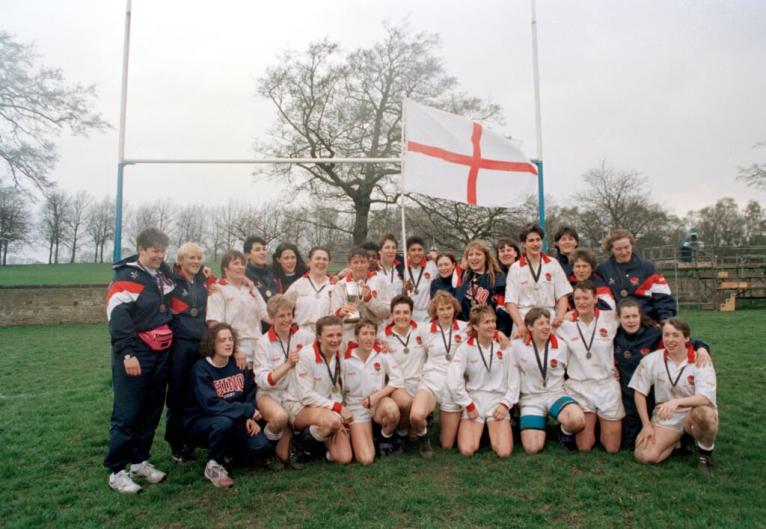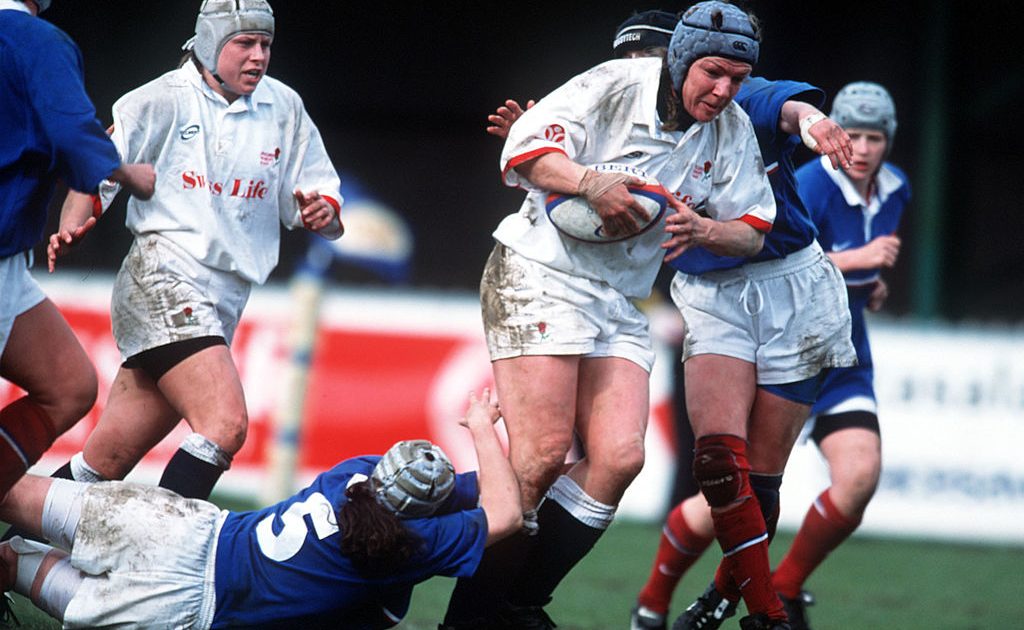1994 World Cup antics: 'Half a pint of vodka went down my throat!'

You’d be hard pressed to find a more charismatic and influential character in helping shape English women’s rugby than Gill Burns.
The former England captain is still heavily involved in the game as the current Lancashire RFU president, working as a rugby administrator and has her fingers in many other rugby-themed pies.
We look back on the former number eight’s career highlights including winning the World Cup with England in 1994, hear how instrumental the former back row player was in finding the original World Cup trophy which disappeared for 15 years and learn about the retired PE teacher of 32 years’ role in setting up Firwood Waterloo Women’s RFC.
Burns begins telling us how she found the sport she has become synonymous with: “My journey with rugby began as newly qualified PE teacher who just loved sport but I began playing hockey.
“At the time I was a big centre forward who scored lots of goals and in a game I ran into somebody who was between myself and the goal who was obstructing me. It wasn’t my fault, but she ended up tumbling to the floor as I ushered her out the way and after I went on and scored the goal I came back to pick her up.
“She then said to me, ‘the way you play hockey, you should be a rugby player’. She said, ‘I’m not being funny. I’m a rugby player and we have a team nearby.’
“I was jogging back to the halfway line and thinking I didn’t know women played. Afterwards I spoke to this same woman in the bar and she said that she played for Liverpool Polytechnic, and anyone who wants to play could join in with them. I just loved the idea of playing rugby.
“This woman told me they trained at Waterloo Rugby Club, so the following Sunday I joined in and immediately knew I’d found the sport for me. Eventually this team led to us setting up Waterloo Women.”
Not uncommon at the time, international players who wanted to play club rugby at a high level, who couldn’t find a club, took it upon themselves to set one up. Well established clubs today such as Saracens Women are in existence due to pioneering former players who took the initiative and wouldn’t’ accept no as an answer. So here lies Burns’ first piece of rugby history, despite Waterloo no longer being part of the top tier Premier 15s, it is proudly playing in Championship North 1.
And there was more history to come…
England’s first World Cup win came in 1994 and Burns has fond memories of the tournament and the celebrations in Edinburgh after.
“Looking back, we got the prize we set out to win. First of all, we made a concerted decision to pay for the best possible hotel to give us a chance to do what we all came to do.
“We said ‘let’s bite the bullet’ and look after ourselves and stay somewhere that will mean we’re comfortable and get a good night’s sleep. During the 1991 World Cup, we stayed in a hotel where we had to leave halfway through the week and we’d all slept in a function room with sleeping bags. For tournaments we were used to staying in youth hostels with bunk beds, it certainly wasn’t luxurious.”
“We were becoming professional with a little ‘p’ and by 1994, the squad were very well drilled, everybody on the park was aware of the game plan and as a squad we were all on the same page.
“One of our group stage matches saw us play Russia and I was asked to captain the team which was such a tremendous honour. I genuinely never dreamed that I’d ever be doing such a thing.
“We knew nothing about Russia in those days. There was no such thing as looking on the internet and finding out. But I thought it might be nice to make a speech in Russian after the game. A friend of Emma Mitchell was a Russian speaker, so I got on the phone and asked them to translate what I wanted to say and learnt the Russian phonetically, trying to write it down on a piece of paper.
“We ended up winning and I gave a post-match speech in very bad Russian, but it made them laugh a lot. Afterwards their coach ran up to me and thrust what I suppose was supposed to be a shot glass but was more like a half pint of vodka down my throat with everyone cheering and laughing. So, either they were very pleased with what I said or pleased it was over!”

“The 1994 tournament was amazing. The best thing about that event was the friendliness of all the teams and people from different countries trying to speak to each other in different languages.
“After we won, I remember the joy of standing amongst a group and teaching them a silly little song, called ‘Cottage in the Wood’ which I knew when I was a small child. You do actions with your arms and your hands so people who couldn’t speak English could join in and I also remember introducing ‘Oops Upside Your Head’ where everyone had to sit on the floor in between the legs of the person behind them and do all the actions.”
It’s fair to say Burns was the orchestrator of the fun and games, but she also lead from the front on the more serious business of locating the original Women’s World Cup trophy which her team won in 1994 when it went missing.
“The last time I’d seen the trophy was in a cabinet in the Twickenham Museum on a school trip. However, the next time I went to Twickenham it wasn’t there. I wondered where it was but in those days the trophy was taken on lots of road trips so I didn’t really ask anybody.
“Then for the 1998 World Cup the IRB (now World Rugby) produced a big shiny new cup which is similar in style to the men’s one and the old cup wasn’t needed. But it just seemed a bit strange that nobody knew where it was!
“And then a few years ago on Twitter, I put a message out and said does anybody know where the World Cup is? But again no one (of my followers anyway!) knew where it was.
Where is the original trophy? #WeNeedPickles pic.twitter.com/JyeeLD1Nl7
— Gill Burns MBE (@Waterloonumber8) September 3, 2014
“Then last year during lockdown, I was back in contact with a few former women’s regional players, and one of the women knew one of the past RFU for Women (RFUW) administrators. It turns out she was clearing out her father’s loft and found one box full of all the minutes of the RFUW’s board meetings, which is very valuable historically, and then in the other box, she said ‘I think it’s the World Cup!’
“It must have been taken to a roadshow and then put in a safe place in the loft out of the way. But after being lost for so many years it was just brilliant that we found it.
“I personally went and handed it over to the curator of Twickenham Museum Phil McGowan for safe keeping!”
And due to Burns’ efforts, the original trophy is currently at the World Rugby Museum in Twickenham on display for everyone to see a real piece of women’s rugby history.
The current World Cup trophy is on its own journey on the 2021 Trophy Tour taking place from April to September 2022, travelling across Aotearoa, New Zealand and the Pacific Islands in lead up to this autumn’s showpiece tournament. No doubt Burns will be one of England’s most enthusiastic supporters as the Red Roses look to bring another trophy back to Twickenham.









































































